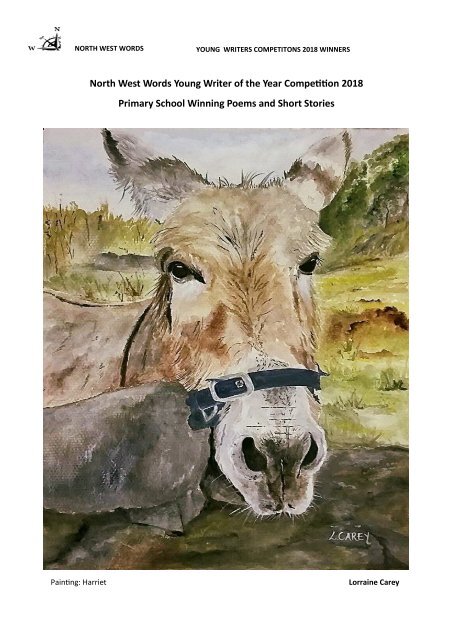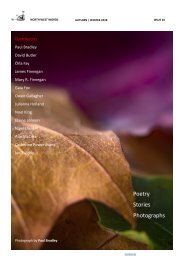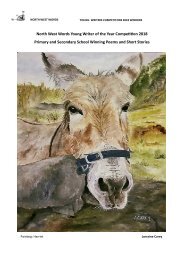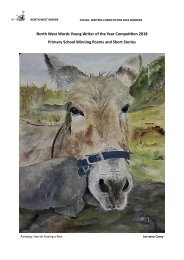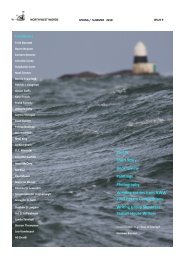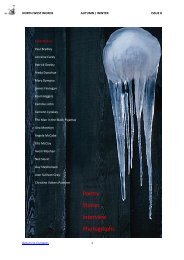Final NWW Children's Competition Winners 2018 (Primary)
Create successful ePaper yourself
Turn your PDF publications into a flip-book with our unique Google optimized e-Paper software.
NORTH WEST WORDS YOUNG WRITERS COMPETITONS <strong>2018</strong> WINNERS<br />
North West Words Young Writer of the Year <strong>Competition</strong> <strong>2018</strong><br />
<strong>Primary</strong> School Winning Poems and Short Stories<br />
Painting: Harriet<br />
Lorraine Carey
NORTH WEST WORDS<br />
YOUNG WRITERS COMPETITONS <strong>2018</strong> WINNERS<br />
<strong>Winners</strong> of the North West Words Young Writers Poetry and Fiction <strong>Competition</strong>s sponsored by Eason with judge,<br />
Deirdre Hines and Councillor Gerry McMonagle<br />
Judge, Deirdre Hines with Tara McDermott, North West Words Young Writer of the Year, <strong>2018</strong><br />
Also a thanks to Lorraine Carey for her paintings. They are used as the front cover and dividers<br />
between the various categories.<br />
2
NORTH WEST WORDS<br />
YOUNG WRITERS COMPETITONS <strong>2018</strong> WINNERS<br />
<strong>Competition</strong> Results <strong>2018</strong><br />
<strong>Primary</strong> School Fiction<br />
1st Place<br />
Octavia's Wish by Tara McDermott<br />
2nd Place Diary of an Orca by Lucian Brown<br />
3rd Place The House of the Goose's Nest by Cornelia Brown<br />
Judge's Notes<br />
The studies of adult creative writers have shown that they were early and passionate readers,<br />
encountering the written word with intense enjoyment, often using reading as an escape from the<br />
world. A prodigy is generally understood as being a child under ten who produces work that is similar<br />
to that of adult professionals. All of this year's winning entries display prodigy.<br />
In third place the writer of 'The House of the Goose's Nest' belies an uncanny wisdom and facility with<br />
sentence and description in a story that is a trip down memory lane for the writer's parents. The sense<br />
this writer evokes of time and place and relationship is quite simply masterful.<br />
In second place the writer of 'Diary of an Orca' achieves what the bardic schools of old always advised<br />
writers to practise; to imagine yourself as other, whether that be a stone, a tree or another person. In<br />
this case, an Orca. The rich imagery this writer uses as the orca travels the oceans displays a knowledge<br />
of marine life. All stories bring their readers on a journey. I particularly enjoyed this author's<br />
re-invention of the tropes of ghost-ships and marine biologists. A triumph of the imagination.<br />
In first place the writer of 'Octavia's Wish' does not put a foot wrong. This is seamless writing. Each<br />
sentence moves the story forward. And what sentences. There is rhythm, visual imagery, and melodic<br />
combinations that work on the ear with the sonorous authority of a tune you want to listen to again<br />
and again. The natural ear for language that prodigies display is not often married with a gift for plot<br />
that includes sophisticated use of syntax, and the parentheses in this story add to the complexity of<br />
the writing. A triumph of voice, style, plot and language meld together in a story that reinvents the<br />
time worn and jaded conceit of change in seasons. The central character will remain with you long<br />
after you have read or heard this story. A writer the world will remember.<br />
The standard of entries in this category was astounding. My longlist counted 16 stories. If there was<br />
any consistent flaw in some of these stories it was from the incorrect use of tenses. I would like to give<br />
special mention to 'My Sister is an Alien' for its excellent plot and 'The Escape' for the funniest line in<br />
the whole competition - 'They lived in a huge mansion and disguised themselves as posh people'.<br />
<strong>Final</strong>ly 'Goldilocks and the Three Reading Bears' crossed genres. A hybrid of fiction and verse in a<br />
beautifully presented chapbook. Keep writing.<br />
3
NORTH WEST WORDS<br />
YOUNG WRITERS COMPETITONS <strong>2018</strong> WINNERS<br />
<strong>Primary</strong> School Poetry<br />
1st Place<br />
Quiz Night by Sean McGettrick<br />
2nd Place The Defeat of the Sewing Machine by Maria Foy<br />
3rd Place<br />
My family by Rebecca Gallagher<br />
Judge's Notes<br />
'My family poem' has one of the best similes in the whole competition -'every one of us is like a<br />
different colour'. It is used as a refrain throughout a poem which celebrates the poet's family.<br />
I loved the way this poet's ear knew when to repeat a word in order to hold the rhythm of the line.<br />
A poet's willingness to play with words is rare. This writer too displays a natural ear for language in<br />
the use of unusual adjectives and the feeling of movement in the poem is carried from the<br />
beginning to the end. A particularly difficult theme to pull off, but this poet carries it above the<br />
general norm.<br />
I look forward to reading more from this poet.<br />
'The Defeat of the Sewing Machine' is a fantastical ballad. This poet has a wonderfully vivid<br />
imagination, and I particularly loved how she resolved the plot. The difficulty with a rhyming ballad<br />
lies in the rhymes not being forced. She carries this off in the main every time. I will never look at a<br />
sewing machine in the same light again. The length of this poem impressed as did the<br />
characterisation. A poet to watch.<br />
First place goes to 'Quiz Night'. This poem takes the shape of nine four lined verses with a rhyme<br />
scheme of aabb. What is masterful here is that each rhyme seems completely natural and in<br />
keeping with the meaning the poet is trying to convey. The poet doesn't restrict the lines to the<br />
same metric count but varies it, allowing for a more natural register. There is also a great wealth of<br />
learning displayed with references to Steinbeck, the use of difficult words like ' octogenarian' and<br />
Greek and Roman gods. There is even the German for goodbye - Auf Wiedersehen in the last line<br />
allowing the poet an ironic moment. Wonderful. I look forward to reading more of this poet's work.<br />
There were some beautiful poems entered in this category that looked at issues such as<br />
homelessness, averted suicide, and love. There were other poems too that celebrated a squirrel's<br />
tale, a magic book, school, Halloween and kittens. They were all very good indeed. If I had any<br />
advice it would be to play with your lines so that the shape of the poem is of your own crafting.<br />
Make your own forms. Invent new words. Devise your own philosophies. Have fun. Keep writing.<br />
4
NORTH WEST WORDS<br />
YOUNG WRITERS COMPETITONS <strong>2018</strong> WINNERS<br />
WINNER OF YOUNG WRITER OF THE<br />
YEAR<br />
TARA McDERMOTT<br />
with<br />
OCTAVIA'S WISH<br />
PRIMARY SCHOOL FICTION SECTION<br />
5
NORTH WEST WORDS<br />
PRIMARY FICTION<br />
Octavia’s Wish<br />
Once upon a time, a quite normal girl, just like you and me, called Octavia lived upon a small hill in<br />
the woods. She lived in a small house, with her small family, on a small street, quite near to a small<br />
town. Every day, she would feed the ducks, sing for the birds and race squirrels up trees, even<br />
though they always beat her. She liked every day of her life, even the days when the birds wouldn’t<br />
sing, the ducks weren’t hungry and the squirrels started a tough game of hide and seek. There was<br />
one thing that Octavia truly detested. It was the season of winter.<br />
Octavia was born in spring. When lambs were born, flowers blooming and everyone playing<br />
outside from dawn till dusk. To her, spring was the most wonderful time of the year. As she grew<br />
up, Octavia realised that many people preferred winter to spring. She didn’t see the reason why<br />
people thought winter was better. Winter was always so cold and frosty.<br />
Sometimes she would hear people talking about snow. Octavia had never seen snow. She<br />
simply thought it was icicles falling from the sky. She heard about snow many a time, saw pictures<br />
and even checked the freezer to see if she could find some. Anyway, she didn’t care. She didn’t<br />
want to see snow. But then a little bit, just a little bit, she really did.<br />
Winters came and winters passed. No snow, no snow, no snow. Every time she pulled a wish<br />
bone from a chicken she wished for snow, she’d wish for snow, every time a rainbow appeared,<br />
she’d wish for snow. Every single time she wished, snow never came. She never told anyone what<br />
she was wishing for. They’d all just laugh at her, and anyway if she told anyone her wish it might<br />
not come true!<br />
One day during the glorious days of spring, it was Octavia’s birthday. Her guests were not<br />
arriving until quarter to two. She decided to feed the ducks some of her mouth-watering birthday<br />
cake, sing a jolly tune of ‘Happy Birthday’ with the deafening birds (they must have turned up from<br />
all around the world since they were so piercing to the ears) and danced a silly dance with the<br />
squirrels. She always savoured her time with nature, because during the cold, hard months of<br />
winter the birds go to warmer countries, but some smart people call that migrating and the squirrels<br />
went to sleep for ages and ages also known as hibernating, as for the ducks, they just didn’t<br />
seem to come out of their cosy homes at all. Octavia liked to imagine all the tiny ducklings gathered<br />
around the hearth while the father duck read the paper and the mother duck made hot cocoa.<br />
Before she knew it, her friends had come and party games were going nonstop. She had gifts<br />
galore including a paint set, a book on how to identify different trees and flowers and a homemade<br />
book along with various other items.<br />
This is what she’d been waiting for. It was time to blow out the candles. She had her cake<br />
specially made by her local bakery and it had a massive flower on it. The petals were crimson and<br />
the centre was a nice lemon colour. She knew exactly what to wish for. Snow.<br />
6
NORTH WEST WORDS<br />
PRIMARY FICTION<br />
So she wished for snow. She supposed it wouldn’t happen as it never did when she wished for<br />
snow, so it didn’t. But what Octavia did not know is if she believed in the magic, her wish really<br />
would come true.<br />
Later on that day, after all her friends had gone home, Octavia was out in the garden,<br />
thinking. Snow. Snow was stupid. How could it cover the ground in a blanket, when it was<br />
apparently like powder? What if you got trapped underneath this blanket, and how on earth would<br />
you build a snowman or have a snowball fight? Would you have to tear this blanket Mother Nature<br />
so kindly gave to us?<br />
All of these thoughts whizzed wildly around her head, as something that was simply amazing,<br />
but she was unaware of, happened.<br />
Because she had pondered the subject of blankets for so long, obscure thoughts raced into<br />
her mind, like how on earth would you wrap a pig in a blanket, and then eat it (who would even<br />
want to do that?)? Or who invented blankets?<br />
Suddenly, the heavens opened and two birds flew out. They seemed to be fighting. Despite<br />
their arguing, the pair flew directly towards Octavia. She immediately recognised them from her<br />
nature studies. They were blue tits. Speedily, the slightly bigger one told the opposite bird to be<br />
quiet. Both of them landed softly on a branch near the little girl.<br />
“You tell her.” “No I did it last time, remember?” Octavia seemed astonished about how these<br />
birds could talk. She’d known them to sing and many birds had become her friends over the years<br />
but had never spoken to her. They seemed to have reached an agreement and one of them turned<br />
to face her. The other whistled in the direction of the forest and out came three squirrels.<br />
“Don’t tell me the ducks are late again.”<br />
“Afraid so, madam.”<br />
“Right, just to get this over and done with,” started the smaller bird, taking out a long scroll in<br />
a bored fashion. “You are Octavia Evergreen and you have either applied at our website<br />
(www.weatherchanger.com) or wished for snow, correct?”<br />
“Correct,” she replied, startled.<br />
“I, Noah McAntface, don’t laugh at the name; hereby grant your wish, as the association of<br />
the weather birds feels you deserve this, especially on your birthday. You may have suffered to get<br />
this far but you have succeeded. Congratulations, and remember, believe in the magic.”<br />
With that, the birds flew away and it began to snow. Real snow. It snowed for days on end, on<br />
Octavia’s small house, with her small family, on a small street, quite near to a small town.<br />
Several days later, the snow began to melt quickly. Octavia peered out her bedroom window<br />
and ran outside, although she was still in her knickers and vest she ran outside. Her snowman<br />
(Fergal) called out her name.<br />
7
NORTH WEST WORDS<br />
PRIMARY FICTION<br />
“Octavia, have you learned your lesson?”<br />
“What lesson?”<br />
“Patience is the key to life.”<br />
And with that he melted, and the young girl ran inside and smiled. From then on winter was<br />
her favourite season. Well, perhaps second favourite, spring would forever be number one.<br />
“Come on ducklings, we’re going to be late,” rushed mother duck. “Where have they gone,<br />
this is our meeting point?”<br />
Tara McDermott<br />
8
NORTH WEST WORDS<br />
PRIMARY FICTION<br />
Diary of an Orca<br />
January 1st<br />
I am a whale. I am big and intelligent, that’s why I speak and can write in my diary. I am black and<br />
white, with a big tail. I spurt water. Sometimes for fun I spurt huge fountains of water.<br />
One time I was having dinner with my parents. I said I would like to have an adventure and go<br />
round the globe. My dad said it would be too long to go through all those oceans.<br />
But I went to bed thinking I should go around the world.<br />
February 1st<br />
I made a map of the globe so that I would not get lost. Dad was not very happy that I was going. I<br />
packed my food, it was mostly shrimp and fish. Mum said it was exciting that I was doing such a<br />
journey. I was particularly looking forward to the Bahamas.<br />
March 17th<br />
Once I was passing Ireland I heard a few odd noises. I thought it was a truck or a police car, but then<br />
I figured out it was Maghery Band on the streets. I wanted to see so I went close to the land. The<br />
band was marching and I could see them!<br />
Once they were finished I thought I should keep going. But suddenly I dropped my map onto land.<br />
Maybe I was too close to the Maghery Band.<br />
But then a little boy threw it back into the sea. I said thanks but he did not understand whale<br />
language.<br />
Just before the day was over I swam away from Ireland. Next I was going to Spain to meet my<br />
friends.<br />
April 1st<br />
The Atlantic Ocean was big and vast. My friends the beaked whales are so lucky to live in such an<br />
amazing place. I said ‘hi’ to Jimmy who was the beaked whale I knew best. ‘Hi,’ replied Jimmy. I<br />
said, ‘do you want to come around the globe with me?’ He said that he’d love to but he was very<br />
busy for the next few weeks. I said that I understood.<br />
We said goodbye, Jimmy told me to stay safe.<br />
Next stop is Sicily.<br />
9
NORTH WEST WORDS<br />
PRIMARY FICTION<br />
May 8th<br />
As I approached Sicily I smelled smoke. Not just any kind of smoke but smoke from a volcano! It was<br />
very active. Suddenly a big boulder fell into the sea. It almost hit me. Then an even bigger one<br />
almost hit me again. I swam along fast as an even bigger boulder flew towards me. It hit me!<br />
Almost!<br />
I thought the volcano was going to erupt very soon. So I swam away.<br />
June 22nd<br />
I swam to the Skeleton Coat in Namibia. I went into a shipwreck. Suddenly my stomach rumbled. I<br />
thought I should eat. Luckily there were loads of fish. So I swam around rounding up all the fish.<br />
Eventually I had eaten five butterfly fish, eleven crabs, one squid, three tortoises, and twenty<br />
jellyfish. I was stuffed. Just then came a great white shark so I swam away.<br />
July 8th<br />
I swam to Australia and saw a boat of whale watchers. I wanted them to see me so I flicked my tail<br />
up in the air. I thought I should do human watching. I saw humans surfing. I enjoyed watching<br />
them. Just then a woman fell off her board. So I went to save her. I put her on my back and put her<br />
back on her board and swam away before someone harmed me.<br />
August 4th<br />
I swam to Antarctica. I saw a ship of scientists, one looked at me. I looked at him. He said ‘there’s a<br />
whale.’ I swam away worried that he might do something to me. I thought I should have some fun<br />
so I swam with my cousin the blue whale. We popped our heads up and frightened the penguins.<br />
We swam under icebergs.<br />
Later I saw the ship of scientists stuck in the icebergs. So I popped my head up and pushed the ship<br />
out. But I swam away before the scientist from a few hours ago came back.<br />
September 16th<br />
On the way home I saw underwater volcanoes. I thought it was very odd. But then I remembered<br />
from my atlas that Hawaii is a state of America in the Pacific Ocean. It is a group of island that are<br />
the tops of underwater volcanoes.<br />
Later that day I saw giant redwood trees. They were huge, but I was even bigger!<br />
10
NORTH WEST WORDS<br />
PRIMARY FICTION<br />
October 31st<br />
When I passed Japan I saw a big ship. Not any ship but a ghost ship! It moved slowly. It was pale<br />
green and icy colours. The pirates shrieked, ‘ahoy, matey!’ at me. They wore caps and stripy tops<br />
and had swords. I was not scared though because they were just ghosts.<br />
All the same I swam away fast.<br />
November 5th<br />
When I saw the first polar bear I knew I was home. Then I saw mum, she raced towards me and<br />
gave me a big kiss and hug. My dad came and said he was relieved I was home. He thought a human<br />
took me to Sea Life because I was gone nearly a year now.<br />
But I was back!<br />
He gave me a hug crying with happy tears.<br />
Just then I remembered I had forgotten to go to the Bahamas!<br />
December 25th<br />
It was Christmas Day. Dad made us a dinner of shark and box jellyfish. I had presents for my parents<br />
from my travels. After we had eaten I gave them their presents. Mum got a pearl necklace. Dad got<br />
a giant seashell. They both loved their presents.<br />
Lucian Brown<br />
11
NORTH WEST WORDS<br />
PRIMARY FICTION<br />
The House of the Goose’s Nest<br />
The house had a name, but I had to ask Mum what it meant. Nead na Gé. It’s the house of the<br />
goose’s nest, she said, but she noticed I was paying more attention to the sky. When we set off<br />
walking from Burtonport, it looked like it might bucket down at any moment. It was a dry spell on a<br />
freezing February day and the wind off the sea kept nearly knocking us over. I couldn’t see why we<br />
were walking so far away from the car.<br />
My little brother, Johann, would have loved to watch the fishing boats but it was too windy.<br />
We walked past harbour buildings, under the massive white windmill. It was my first time seeing the<br />
windmill up close. We live on the other side of the bay and from there it looks like a toy. It was loud<br />
too, when you’re hurrying along underneath.<br />
My dad is a landscape painter and I could see him looking around when we left the fish<br />
factory behind. Now it was all land and sea and rocks with small boats. The kinds of things he puts in<br />
his pictures.<br />
It felt like we’d been walking a long time, but we really hadn’t. The path got narrower and the<br />
clouds got bigger and darker. I wanted to turn back.<br />
There’s the boathouse, said Mum, pointing to an old grey building. Still there, said Dad. It’s<br />
starting to rain, I said. We all looked up. It’ll hold off, said Dad. Come on, quick.<br />
Soon we found ourselves standing in front of a huge closed gate, taller even than my Dad. We<br />
lived here, said Mum. A long time ago we took a year out of college and ended up here. Mum and<br />
Dad met in art college in Dublin when they were teenagers. I would be a teenager in two years.<br />
Dad was opening the gate. Mum said careful, there might be a dog. Look at the place, said<br />
Dad, pulling the gate wide. No one has been here in ages.<br />
We walked in. We stood in front of a long building with three padlocked doors and boardedup<br />
windows. Mum and Dad were just staring. Johann was looking all around. This is where we lived,<br />
said Mum. I couldn’t believe anyone could live there. It looked more like a shed than a house and<br />
like it might fall down before our eyes. It was grey and dirty and sad. It looked nicer when we were<br />
here, said Mum. It was pink. She was pointing again, this time at little specks of pink on the grey<br />
walls. Don’t go to art college, guys, said Dad, heading off in the direction of a little path.<br />
This was the main house, said Mum. The caretaker lived here with a big black dog called<br />
Barry. We didn’t have a kitchen so we cooked dinner up here. Look, the curtains are still the same.<br />
At least this looked like a house, a very big house, but it was in a bad state. Moss was growing all<br />
over the roof and the paint was worn away. It looked sad too, but happy in comparison to where<br />
Mum and Dad lived.<br />
Although evening was hours away it was getting dark. We should go, I said. Nobody moved so<br />
I just set off back down the path and they followed. That’s when I saw the little grey cat curled up<br />
12
NORTH WEST WORDS<br />
PRIMARY FICTION<br />
asleep on top of a hedge. I said hello, but it didn’t move. It was made of stone! And it wasn’t on top<br />
of the hedge, there was a wall behind the hedge. Was this here when you lived here? I asked. Mum<br />
and Dad looked and shook their heads. Don’t think so, they said. But the cat looked like it had been<br />
there a long time, just sleeping.<br />
Johann spotted the pond through a gap in the hedge and walked over. It had frogs when we<br />
were here, said Mum. Now it looked dark and full of weeds. Johann felt his feet getting wet so he<br />
turned around.<br />
Dad found it hard to close the gate, it was so heavy and damp and the latch was rusty. Mum<br />
and Dad seemed sad leaving and kept looking over their shoulders as we walked away.<br />
We were halfway back to the harbour when the rain started. We ran to a hawthorn tree and<br />
put up our umbrellas. Mum and Dad shared their green umbrella with polka dots. Johann spotted a<br />
boat moving from under his Spiderman umbrella. My Moshi Monsters umbrella kept me nearly<br />
completely dry, even when the rain got heavier and heavier and the boat heading out to sea<br />
vanished even though it was still there.<br />
My legs were getting tired by the time the rain grew lighter and we were talking about moving<br />
on. Still under our umbrellas we left the hawthorn and walked towards the sound of the windmill.<br />
Imagine if we were walking back here back when we lived at Nead na Gé and we met this little boy<br />
and girl walking along the road, said Mum, looking at me and Johann. I wonder if they’d know who<br />
we are.<br />
Cornelia Brown<br />
13
NORTH WEST WORDS<br />
YOUNG WRITERS COMPETITONS <strong>2018</strong> WINNERS<br />
Painting: Daisies in Sunlight<br />
Lorraine Carey<br />
14
NORTH WEST WORDS<br />
PRIMARY POETRY<br />
Quiz Night<br />
If you know how old an octogenarian is [eighty],<br />
Or where Port- Au-Prince is the capital of? [Haiti],<br />
Then the school’s quiz night will be for you [definitely],<br />
Because if you win this, you’ll be smart enough for the presidency.<br />
The recipe for a winning team: A clever clogs who’s always right,<br />
Who knew the highest mountain and inventor of the light,<br />
Our sports correspondent, who knows it all,<br />
From pitch to court, doesn’t matter which ball.<br />
Our history buff knows thousands of dates,<br />
Kings and Queens with all their ill fates.<br />
The icing on the cake will be someone who can write fast.<br />
Heaven knows, you don’t want to come last!<br />
You’ll need to listen to the questions however, don’t be caught out,<br />
Let them repeat it, if you have any doubt,<br />
Don’t rush: Always think before you speak,<br />
Don’t be mistaking the Roman gods for the Greek.<br />
The night was upon us, it was all very tense,<br />
I had a good feeling, almost a sixth sense,<br />
There was a hush through the crowd as the MC began to talk,<br />
We’ll be fine, as long we know the scientific word for chalk.<br />
First question was easy about a high street store,<br />
Which is not just a book shop but so much more,<br />
Selling toys, games and books for all the seasons,<br />
There is only one choice it must be Easons.<br />
The second question was harder, we hadn’t a clue,<br />
For it was “What is the currency of Timbuktu?”<br />
Three and four were easy enough, we got them right,<br />
Then five came along and gave us a fright.<br />
15
NORTH WEST WORDS<br />
PRIMARY POETRY<br />
It was the nearing the end and we’re in the lead<br />
Everyone was expecting us to succeed.<br />
We couldn’t see how anyone can be greater,<br />
Then the MC announced, “We have a tiebreaker!”<br />
<strong>Final</strong> question, who wrote “Of Mice and Men?”<br />
“I know this”, I cried, “Give me the pen!”<br />
“John Steinbeck, of course. He’s in my top ten!”<br />
Quiz over, we won! Auf Wiedersehen<br />
Sean McGettrick<br />
16
NORTH WEST WORDS<br />
PRIMARY POETRY<br />
The Defeat of the Sewing Machine<br />
Verse 1<br />
There was an old lady, who was right and just,<br />
Who had an old sewing machine that was getting rather bust.<br />
She took it to a car fixer but he said, “GO AWAY!”<br />
She asked a fishy fox, but he declined and didn’t stay.<br />
Verse 2<br />
She had a very scary dream that happened just that night,<br />
So she went downstairs to her tea and held on way too tight.<br />
She drank it and drank it until her tummy gurgled,<br />
Suddenly t’was a knock on the door and in came Mr. Furgle.<br />
Verse 3<br />
He said I might be at your service offering out his hand,<br />
She shook it and realised it felt like crumbling sand.<br />
She showed him her problem and said aloud just why,<br />
She didn’t have the money for another one to buy.<br />
Verse 4<br />
“I might just have to take it home, if you want it well.”<br />
So he did just what he said but cast a mighty spell.<br />
He made it go ballistic eating everything in sight,<br />
It didn’t stitch things up with its enormous appetite.<br />
Verse 5<br />
When it was brought back to its rightful home,<br />
It didn’t move a bit just yet, it didn’t even roam.<br />
The old lady squealed with glee, she couldn’t just remember,<br />
When she’d been this happy, maybe late December?<br />
17
NORTH WEST WORDS<br />
PRIMARY POETRY<br />
Verse 6<br />
As she left the room with glee, she suddenly started to wonder,<br />
Where did all the lamp shades go and the lightbulbs that went under<br />
She turned around quite frantically to see oh, such a mess,<br />
The machine had gobbled up the table and her nicest kitchen press.<br />
Verse 7<br />
The kitchen was its starter, its main course was the stairs,<br />
For dessert it ate the neighbourhood which could not be repaired.<br />
It soon took over Ireland, the world began to fall,<br />
To the moon and stars and back it really gobbled all.<br />
Verse 8<br />
Except for a lad named Jimmy Foy, who was from Ardee,<br />
Who was here and well and going to save his cup of tea.<br />
At least he came up with a plan that he thought would do the trick,<br />
He got a piece of thread and needle but the clock was starting to tick.<br />
Verse 9<br />
So he put a spell on it to make it rapidly fast,<br />
And soon his plan was working and it looked like just the past.<br />
So how was he supposed to put an end to the machine?<br />
Soon a thought came easily, quick, good and clean.<br />
Verse 10<br />
Everything has an off button, so why would this not?<br />
So he went straight to the beast and attempted to his plot.<br />
Jimmy won the VICTORY late that night at half past three,<br />
And went home to drink his tea, in his very own Ardee.<br />
Maria Foy<br />
18
NORTH WEST WORDS<br />
PRIMARY POETRY<br />
My Family<br />
I love my family<br />
My family is great<br />
Sometimes we are silly<br />
And sometimes we are late<br />
Every one of us is like a different colour<br />
Even though we fight we’ll always love each other<br />
The stories we read at bedtime make us very happy<br />
It makes us laugh out loud because it’s really funny<br />
One time we went to a wildlife park and saw some tigers and cheetahs<br />
We got some umbrellas and raincoats but then the sun came out to meet us<br />
On our summer holidays we visit lots of places<br />
We see our friends and family and lots of different faces<br />
We drove from the South East to the North West in one day<br />
To beautiful Cruit Island from lovely Ardmore Bay<br />
We love when we’re together but sometimes we say goodbye<br />
We get a little sad when daddy has to fly<br />
But then we think of happy times and all the fun we had<br />
And when we look at photographs it makes us feel so glad<br />
I love my family, my family is great<br />
Sometimes we are silly and sometimes we are late<br />
Every one of us is like a different colour<br />
Even though we fight we’ll always love each other<br />
Rebecca Gallagher<br />
19
NORTH WEST WORDS<br />
YOUNG WRITERS COMPETITONS <strong>2018</strong> WINNERS<br />
Painting: Ascension<br />
Lorraine Carey<br />
20
NORTH WEST WORDS<br />
CHILDREN’S WRITING COMPETITONS <strong>2018</strong> WINNERS<br />
Photograph: Bronze Statue, Hiring Fair Boy, Market Square, Letterkenny, Co. Donegal<br />
Eamonn Bonner<br />
Paintings by Lorraine Carey<br />
Lorraine Carey is a poet and self-taught artist, specialising in oils and watercolours. A Decorative Glass<br />
Designer by trade, she often uses natural materials such as slate and stone as well as glass in her work and<br />
uses her rural surroundings as the focus of many pieces. She draws on inspiration from wildlife, flowers and<br />
birds. Sea and landscapes feature mainly in her oil compositions, capturing the myriad of changing colours<br />
within the ocean, skies and the rugged contours of Ireland's stunning coastline. All Lorraine's art to date,<br />
features on her page Lorosio Art https://www.facebook.com/CareyLorraine1/<br />
Eamonn Bonner is from the fishing village of Burtonport and true to his roots ,many of his photographs are<br />
of the coast and the sea. Eamonn's last solo exhibition was in Cafe Blend Letterkenny. His photographs have<br />
featured in books, magazines and local newspapers.<br />
With special thanks to our young writers competition sponsor, Eason Letterkenny<br />
21


